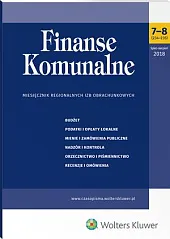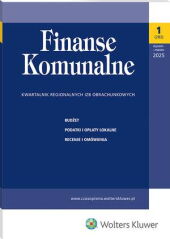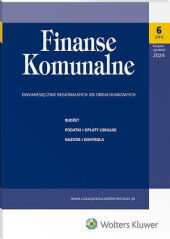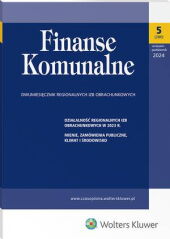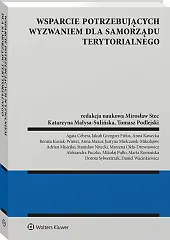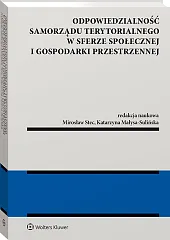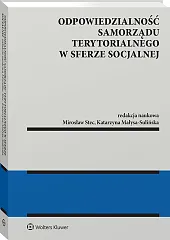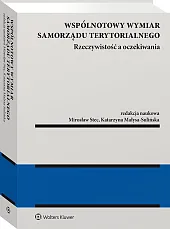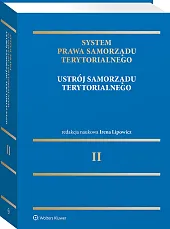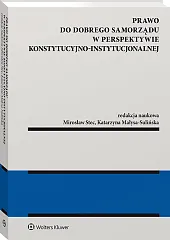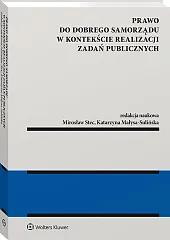ARTICLES
Krzysztof Surówka
p. 5
Maciej Hadel
p. 13
Paulina Mąkowska
p. 27
BUDGET
Małgorzata Natoniewska-Stasiak
p. 41
Mirosław Czekaj, Dominik Rogowiecki
p. 68
LOCAL TAXES AND CHARGES
Tomasz Wołowiec
p. 76
PROPERTY AND PUBLIC PROCUREMENT
Paweł Derlecki
p. 80
SUPERVISION AND AUDIT
Dariusz Melerowicz, Magdalena Batkiewicz
p. 89
CASE LAW
Agnieszka Rzetecka-Gil
p. 112
REVIEWS AND OVERVIEWS
Piotr Korzeniowski
Review of Mariusz Szyrski’s book “The role of local authorities in the development of renewable energy sources (RES). Administrative law analysis, Warsaw 2017, p. 188
p. 118
VARIA
Luiza Budner-Iwanicka
p. 122
Table of Contents & Abstracts
p. 158
Krzysztof Surówka
The role of the operating surplus in fi nancing the development activities of local authority units and satisfying public needs (using the example of municipalities and cities with the rights of counties in the years 2011–2017)
The fundamental objective of the activity of local authorities is to satisfy the needs of local communities. However, this objective cannot be achieved without taking up development activities.
Funds for fi nancing the investment activities of local authorities come from external sources. These are most frequently facilities, loans and bond issues, but also subsidies from the state budget and funds from foreign sources, including non-repayable funds. However, in order to absorb them, the LAU’s own contribution is required, which should be secured by an operating surplus.
The objective of the article is to present the operational surpluses of municipalities and cities with the rights of counties, as well as to relate this economic category to expenditure on investments and the level of local debt.
The results of the analyses have become the grounds for drawing conclusions about the fi nancial condition of local authority units in Poland.
Back to top
Maciej Hadel
Admissibility of the municipality planning the location and course of public roads on private land in the land use plan and the matter of the confl ict of public and individual interests – considerations in the light of the verdict of the Voivodship Administrative Court in Gliwice of 24/07/2017, II SA/Gl 276/17
The municipal council has at least the right (if not the obligation) to plan the location and course of public roads in the land use plan within the framework of its planning obligations related to the assurance of an appropriate system of transportation and technical infrastructure. The planned roads may also cross private land if such a location is rationally justifi ed and does not extend beyond the scope of the municipal council’s authority. This argument, which was expressed by the Voivodship Administrative Court in Gliwice in one of the judgements, has a normative and adjudicative justifi cation with regard to the matter of resolving the confl ict of public interest with the individual interest. It also arises from the nature of the administrative law powers.
Back to top
Paulina Mąkowska
A fi ne for coercion in enforcement proceedings in administration – its genesis and legal nature
The fi ne for coercion is treated as a means of administrative enforcement of non-monetary obligations. The legislator mentions this measure as the fi rst of the measures of enforcement of non-monetary obligations in the list provided for in the currently applicable enforcement act. As the only measure of all those used in administrative enforcement, the administrative fi ne for coercion is of a coercive and not a satisfying nature, which makes this an exceptional measure. The normative basis of the fi ne for coercion has already received its fi rst Polish legislation. The fi ne for coercion must be distinguished from a fi ne applied in criminal proceedings, as well as a fi ne imposed in the course of proceedings in cases of misdemeanours. The fi ne for coercion purposes may be imposed at the amount specifi ed by the legislature for both natural persons and legal persons, as well as for unincorporated organizational units. This measure is also used in enforcement proceedings conducted in local authority units.
Back to top
Małgorzata Natoniewska-Stasiak
Implementation of budgets by local authority units in 2017
The article presents the fi nancial situation of local authority units in 2017. It was based on the “Report on the activities of the regional chambers of audit and the achievement of the budget by local authorities in 2017,” which was submitted to the Sejm and the Senate by the National Council of the Regional Chambers of Audit in June 2018.
Back to top
Mirosław Czekaj, Dominik Rogowiecki
Forecasts of fi nancial plans of local authority units for the term 2018–2023
The article presents the results of research and analyses regarding the fi nancial intentions of local authority units for 2019–2023, i.e. for the new, extended term of offi ce of fi ve years, with particular emphasis on forecasts of outlays on property expenses, the budget result, repayable fi nancing and the comparison of the plans for the new term with the implementation of the local authority unit budgets in the last fi ve years.
Back to top
Tomasz Wołowiec
Port infrastructure and property tax
The article discusses the issue of port infrastructure which is exempt from property tax, even if it has only been made available to authorized entities. According to Article 7, para. 1, item 2 of the Act on Local Taxes and Charges, port infrastructure buildings and machinery, infrastructure buildings and machinery providing access to ports and harbours, as well as land occupied by them are exempt from property tax. The Act on Local Taxes and Charges does not contain a defi nition of “port infrastructure” and “buildings and machinery providing access to ports and harbours”. In such a case, reference should be made to the Act on Sea Ports and Harbours and the defi nition contained in it should also be used for tax purposes. Public access means the possibility of providing access to port infrastructure for authorized entities (e.g. on the basis of a civil law contract). Limited access to infrastructure does not affect tax issues, given that it is diffi cult to accept that, for example, fi shing boats would have access to LNG. Therefore, port infrastructure buildings and machinery are exempt from property tax.
Back to top
Paweł Derlecki
Performance of public tasks by municipal companies in the light of the report of the Supreme Audit Offi ce
The subject matter of this article is the presentation of issues related to the performance of public tasks by local authority units in the form of a commercial law company, in the light of the results of an audit conducted by the Supreme Audit Offi ce. The Act on Municipal Management grants local authority units the right to establish commercial law companies, treating them as one of the possible forms of fulfi lment of public tasks. However, as the audit results show, a number of irregularities appear in the establishment of commercial law companies by local authorities. At the same time, the Supreme Audit Offi ce refers to the need to amend the large number of provisions by clarifying the concepts used in them, such as “public utility” or “public utility tasks”.
Back to top
Dariusz Melerowicz, Magdalena Batkiewicz
Results of the coordinated audit named “Audit of the indebtedness of independent public healthcare centres, for which the founding entities are local authority units”, conducted by the regional chambers of audit – part 1
The Regional Chambers of Audit conducted a coordinated audit in 2017 into the indebtedness of independent public healthcare centres for which the founding bodies are local authority units. The objective of the audit was to assess the current state of indebtedness of the independent healthcare centres in 2015–2016 using the example of selected units in individual voivodships and its impact on the fi nancial situation of the local authorities. The results of the audit show that indebtedness is still a serious problem in the audited units, which requires its ongoing monitoring and update of legislative duties in this area.
Back to top
Agnieszka Rzetecka-Gil
Collection of a fee for the provision of services as a form of use of municipal property. Commentary on the ruling of the Supreme Administrative Court of 26/04/2017, II OSK 550/17
The commentary contains an overview of the prohibition of municipal councillors to conduct business using the municipality’s municipal property, as referred to in Article 24f, para. 1 of the Act on Municipal Self-Government. However, it does not apply to such a situation when a councillor conducts business using other real property of the municipality, exclusively providing services to the municipal organizational unit, for which he receives a fee. Can there be talk, in this situation, of the councillor doing business “using” the municipality’s municipal property?
Back to top
Luiza Budner-Iwanicka
Activities of the regional chambers of audit in 2017. Overview of the Report of the National Council of Regional Chambers of Audit submitted to the Sejm and the Senate of the Republic of Poland
The paper discusses the activities of the regional chambers of audit and the National Council of the Regional Chambers of Audit in 2017. The text was based on the fi rst part of the “Report on the activities of the regional chambers of audit and the achievement of the budget by local authority units in 2017,” which was submitted to the Sejm and the Senate of the Republic of Poland in June 2018.
Back to top



